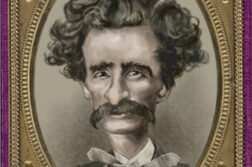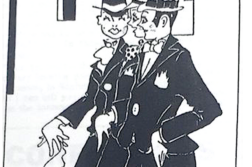Gay men hone their humor to hide their pain. But in prison, there is none of that witty repartee. Incarcerated men are reluctant to expose themselves, to let the façade peel away. Many are scared little boys still looking for acceptance. Fitting in is a survival mechanism. Prison gangs are an extension of that cowardice. They provide protection to those too afraid to stand out from the crowd—to fend for themselves and defend their beliefs.
Any deviance from prison norms is suspect. A man who doesn’t walk with a swagger, his pants loosely hanging, exposing his ass to the world in a defiant “fuck you,” is considered soft. A prisoner with a good vocabulary who doesn’t refer to everyone as “that nigga,” who doesn’t punctuate every spoken thought with “ya heard” or “na mean,” is perceived as a homo. Prisoners who read literature, not ’hood novels, are queer. Most prisoners are afraid to listen to their inner voice, to be unique.
Yet I too am guilty of failure to sustain my beliefs, to tackle introspection. For years, I suppressed my honest feelings in prison. I feigned; I prevaricated; I denied to others, and to myself, that I was gay. To disguise my true identity, I espoused the anti-gay hostility and embraced the ignorance. Like a gang member, I feared to be distinctive, to stand up for what I believed in. As a result, my sexual orientation began to shift. My sexual fantasies started to include women. Late at night, on a rickety black and white TV, I watched straight porn—antediluvian movies with laughable dialogue, provided by the Department of Corrections (DOC) to appease and quiet the masses. Some of the male “actors” turned me on (some were fat hirsute beasts), but I was also turned on by the women. In much better physical shape than the men, they were often resplendent Sirens.
Like stodgy parents, DOC only broadcasts the risqué movies on weekends, never on school nights. When the TV porn is unavailable, in an effort to induce sleep, I masturbate in the darkness of my cell. I envision big-breasted women getting fucked by muscular men. During orgasm, I shoot my load into a woman, fantasizing I am a straight man. […] After seven years of incarceration, I see my sexuality transforming from exclusively gay to bisexual. I have become a victim of my fellow prisoners. I have convinced myself I need to think, and be, straight.
Prison is so full of animosity and bile that all men are subconsciously affected by it. We attack each other in the yard—punching and stomping—without recognizing the source of pent-up anger. Revenge takes the form of cuttings and stabbings. I see countless men with heinous scars stretching from their ears to the corners of their mouths, some horribly disfigured. Genetically prone to hypertrophic scarring, black skin often produces ugly welts when injured or cut. Guys on their way to the prison showers proudly display knife scars that wrap around their rib cages like vestiges of great white shark attacks. […]
BEFORE GETTING LOCKED UP, I was a proud gay man. I never hid my sexuality. I reveled in it, vitalized by the aura of the forbidden. At times, entering the chic gay club of the moment, passing the masses waiting to get in, I flaunted my elite status, my membership in the haut monde of New York’s nightlife. But once cloistered behind Attica’s concrete walls, cut off from the world of shirtless, sweaty men on the dance floor and pavonine drag queens decorating overstuffed furniture like throw pillows, I retreated into my shell like a scared turtle. I shut the door so tightly, not a ray of light passed the threshold. Slowly, insipidly, like a metastasizing tumor, fear and self-loathing overtook me, corroding my self-esteem.
Only a small number of prisoners are openly gay, even flamboyantly so. I admire their courage, yet I treat them with disdain, avoiding the nelly ones like a contagious skin disease. I’m afraid that if I even speak with them I will be labeled gay, a “fuckin’ faggot.” Before being incarcerated, when I encountered an effeminate man in a nightclub or at a cabaret show, I was amused, freely laughing at their self-deprecating humor. In prison, that open acceptance came to a screeching halt. Weakened and emasculated by prison attitudes, I failed to stand on my beliefs. Incarceration changed me, and I didn’t like what I saw in the warped, scratched prison mirror.
Surreptitiously, shame transformed my values. Prison morality overtook me. The poison and hostility spewed by inmates toward sex offenders, the government, the police and just about anyone who was different from us invaded my mind, my cells, my DNA. Animosity toward the outside world altered my personality, the very neurons and axons that comprised my gray matter. Bitter and venomous, I fantasized about revenge. At night, with my prison blanket pulled over my head, I looked forward to getting out of this Kafkaesque shithole so I could tell the entire world to just leave me the fuck alone.
As I sat in my cell, penning this essay, trying to turn the prison lockdown into something productive, my concentration was interrupted by the jangling of keys and clomping of boots on the gallery—the ominous sound of an officer approaching. I looked up as he passed my cell wearing purple latex gloves. Panic set in. Purple gloves were used for cell searches and strip-frisks. I heard the sound of more boots approaching, along with snickering and laughter.
“The assholes in honor block think they’re special, don’t they?”
“Yeah. Well, we got somethin’ special for ’em.”
About thirty officers assembled on the gallery, one or two in front of each cell. A white-shirt walking down the gallery shouted, “Take all the sheets off ya mattress. Strip down to ya boxer shorts. Step outta ya cell holdin’ ya mattress.”
The whirr and grinding of electric motors began as cell gates opened. I yanked the sheets off my bunk, folded the mattress, and got undressed. Making a mental inventory of my cell, I tried to recall if I had any contraband—extra sheets, pillows, a TV with no permit—fuck it, they can have it. My books: I knew I had over the limit of 25. Between the writing class, college classes, favorite authors, Spanish and English dictionaries, and a world almanac, it was easy to far exceed the maximum. They can have anything, just don’t take my books. There was no way I could replace them on a prison salary of seven bucks a week.
Two officers came to my gate. I immediately sized them up. One was older, looked pretty laid back. The other, a young kid, I knew was a straight-up asshole. He always had some smart-ass comment. If you asked him a question, his standard response was, “What are you, a fuckin’ retard?”
My gate opened. The young kid said to me, “Step out, stupid, with your mattress.” I picked up my stained, decrepit mattress, folded it in half, and carried it out onto the gallery. Standing there, facing my cell, wearing just boxer shorts and shower scuffs, I felt embarrassed and vulnerable. The older officer started looking through items in my desk area—papers, books, typewriter. He checked to see that my ID number, etched into the clear plastic case of the typewriter, matched the faded yellow permit taped to the wall above my desk.
The younger officer started taking stuff out from under my bunk: storage bins, two bags of books, and folders with college notes and essays. Riffling through the folders, he threw paper onto the barren steel bunk, forming a pile. He opened my storage bins and took the neatly folded clothes and threw them onto the bunk also. When he came to the bags of books, he looked at me through the bars of my cell. “What the fuck is this? How many books you got?”
I wasn’t sure, but I knew there were more than 25. “I’m not sure, sir. I think about thirty or so.”
“Thirty! What the fuck. You know you’re only allowed 25, don’t cha?”
“Well, I’m in the college program, so some of the books aren’t mine. I have to turn them in at the end of the semester.”
“College. That’s a fuckin’ waste of taxpayer money.” He threw the books onto the bunk, still in their bags, without even looking at them. Opening my metal storage locker, he looked inside, then picked the locker up and threw it onto the bunk. The steel door banged open. He started removing the contents—batteries, typing ribbons, pens, deodorant—suspicious of each item. Opening my jar of instant coffee, he stuck his index finger into it, swirled the contents, then closed the jar and tossed it onto the bunk. He came across my Braun electric razor—a gift from a good friend. Inspecting it carefully, he asked me, “You got a permit for this?”
“No, sir. The package room didn’t give me one. But they engraved my ID number on the case.” He flung the razor out of my cell. Striking the brick wall just to the left of my head, it shattered, and lay at my feet in three pieces. I was so stunned, I said nothing, just stared straight ahead.
After what seemed like an eternity, but was actually only fifteen minutes, the two officers exited my cell. The one who had busied himself examining the items on my desk left everything exactly as he had found it. The other officer, with a baseball cap turned backwards and a snotty attitude, left a mountain of debris.
As the officers walked away, the younger one said with a smirk, “Take it in.” I wanted to tell him, “Why don’t you take it in? Take it in your ass.” Instead, meekly, I entered my cell, propped my ancient horsehair mattress against the wall, and started to reassemble my cell, slowly picking away at the mess on my bunk, while still in my boxer shorts. An hour and a half later, with everything put back in place, I tossed the mattress onto the bunk, threw my sheets and blanket over the mattress, and lay down, exhausted, my back screaming with pain. Frustrated with the humiliation and abuse freely served up by prison administration, I fantasized about revenge.
I had once naïvely espoused the importance of change in prison. In classrooms, as a facilitator, I lectured about the opportunities for education and the value of volunteer programs like AA and Alternatives to Violence. In my personal essays I wrote about my transformation as another step on my path to enlightenment. I embraced prison as an opportunity for personal growth. But I didn’t foresee that I would fall victim to the acrid, hateful culture that pervades the institution. Not only the inmates, but the correction officers and even the counselors that run the supposedly rehabilitative programs toss dead branches and logs on the funeral pyre that heats the prison with contempt and scorn. The institutional mantra is “Fuck it, why bother?” I try to be vigilant against such negativity, but it’s so easy to kick back, to exude hatred and prey on the weak. […]
As the potent summer sun heated up A-block yard, beefy men on the weight pile stripped off their shirts. Sinewy muscle glistened under the unctuous coat of sweat. In my cell, hidden from their view, I admired the chiseled chests and lean stomachs. I lusted, tussling with guilt. The lustrous black skin radiated strength. The olive complexion of Hispanics enhanced their meaty pecs and stood in contrast to nipples the size of quarters.
Yet like a frightened child guilty of venal sin, I hid in the shadows. I couldn’t share my feelings with anyone. Drawing inward, afraid of prison prejudice, I built a façade with bricks and mortar. The guilt festered like a boil that needed to be lanced. But as the infection went untreated, the pain intensified, until the pus had nowhere to go except outward. As I stared out at the A-block weight pile, the handsome shirtless men dissolved. The sun retreated behind the clouds of a steel-gray sky. Verdant grass withered, leaving a yard empty of life. Latex gloves dotted the muddy terrain like used condoms under a shadowy concrete bridge. A ripped pulp fiction novel littered the barren yard. Its pages held the story of a mensch, a Gregor Samsa character, whose transformation left him trapped. Bitter and helpless, he could not escape the confines of his prison.
As a cold, steady rain fell, a gusty wind picked up and scattered the sodden pages—pages that told a story with no resolution, a plot that failed to unfold.
[/groups_member]




